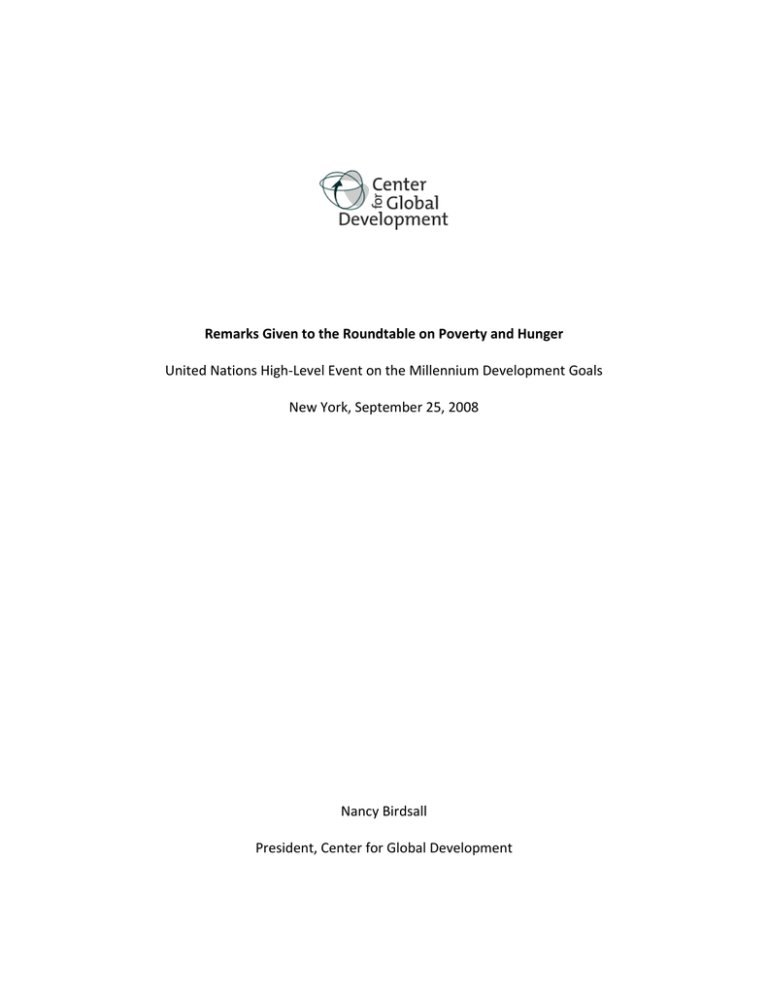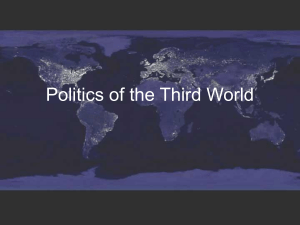United Nations High‐Level Event on the Millennium Development Goals New York, September 25, 2008 Remarks Given to the Roundtable on Poverty and Hunger
advertisement

Remarks Given to the Roundtable on Poverty and Hunger United Nations High‐Level Event on the Millennium Development Goals New York, September 25, 2008 Nancy Birdsall President, Center for Global Development I feel greatly privileged to have the opportunity to address many of the world’s heads of states at this United Nations Roundtable on Poverty and Hunger, and I congratulate Secretary‐ General Ban Ki‐Moon for organizing this and the other roundtables today. New York City in the last couple of weeks has been the epicenter of a global financial crisis. Attention to that crisis, and to the regulatory and other failures behind its prevention, should not distract us from the more heartrending and equally preventable crises that occur every day in the lives of poor people around the world. We must equally think of it as a crisis when a food price hike leads a 12‐year‐old to drop out of school, or a father’s sudden death means an adolescent girl sells her body to pay a sibling’s school fees, or a desperate farmer commits suicide because a bad year means he cannot pay his debts. I do not want to recite the statistics on global income poverty you all know well. On the one hand, rapid economic growth in China and India has moved millions of people out of deep poverty. On the other hand, despite recent healthy economic growth including in the poorest countries of Africa, and declines in the proportion of poor in many countries, the absolute number of poor people in many countries has continued to rise. As a global community, we have won some battles, but we are still on the losing side in the global war on poverty. I spent more than two decades at the World Bank and the Inter‐American Development Bank thinking and talking and advising— let me call it “fussing”—about how developing country governments could grow and reduce poverty faster. It took time but it dawned on me that the war on poverty will not be won by people like me, nor by well‐meaning international donors and advisers and NGOs, no matter how much money we bring or how wise our advice or how sincere our efforts. It will be won by the leaders and citizens of developing countries themselves. At the same time, in an increasingly and intensely interconnected global system, I could not deny that what rich country governments do, and sadly quite often what they fail to do—in matters of trade, migration, greenhouse gas emissions, intellectual property rights and financial policies—does matter too. I decided it was time to turn my attention to “fussing” about the action or inaction and the policies and practices of the government of my own country, the United States, and of the governments of other rich countries, and of the international institutions where after all rich country governments still have dominate in power and influence —including the World Bank, the World Trade Organization and yes the United Nations itself—in this war on poverty. So what I do and what the institution I am proud to lead does is call rich world governments to account for their actions and inactions on their commitments to fighting global poverty. That brings me to the Millennium Development Goal 8—the only goal which refers explicitly to what rich countries are committed to do. I wonder how many of you know what the eighth goal actually says. No matter. No need to study it. The text of the eighth goal is a hodgepodge of elements reflecting the reluctance of some rich countries to be too specific when the goals were being negotiated and the special pressures of different groups of poor countries as well. But the spirit of goal 8 is straightforward. The rich countries have made commitments to which they should be held to account. Today I urge those of your gathered here, at this midpoint between the Millennium year 2000 and 2015, to use your power and influence to find a way to put teeth into the 8th Goal. That seems to me to require at least two simple steps. First, each rich country government could agree to revisit and restate its own commitments in concrete and measurable terms—in such areas as aid, market access, transfer of technologies, and investment in agriculture, health and energy technologies appropriate to developing country needs. How ironic that the United Nations carefully assesses and reports on the progress of developing countries against the MDGs, but has no measures or indicators and no periodic official reports on the progress of the rich countries against their commitments to those goals! At the moment the only concrete measure of rich country commitment is the proportion of GDP dedicated to aid. Yet the quality of aid is on average so poor—because it is tied, fragmented, uncoordinated and unaligned with developing country programs and budgets, and almost entirely input‐based instead of outcome‐oriented—that the quantity from any one donor is a poor measure of even that donor’s own real contribution. And of course aid itself is only one measure of a rich country’s overall commitment to development and the war on poverty. Because joint accountability of the “rich world” amounts to no accountability for anyone, I urge that these commitments be measured and reported at the rich country level. Second, each rich country could agree now to report annually to the United Nations on its progress against its commitments, and to make those reports available to the public, including to their own citizens for discussion and debate before they are formally submitted. It is difficult to imagine that all of the world’s rich countries could agree easily and quickly on the nature and shape of such measures of their own commitments, or on the nature and content of published reports on their progress. But there is no need for agreement on a single common set of measures or a single common approach to reporting. I urge the Secretary‐General to look for volunteers to jumpstart this approach among rich country government, and harness the moral power of the United Nations to put real meaning into the often forgotten Goal 8.





